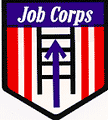|
Job Corps course title: Machining. Students in this class learn machining procedures through bench work and layout, followed by hands-on operation of a drill press, engine lathe, and vertical mill. Principles of Computer Numeric Control (CNC) and operation of CNC milling machinery are also included.
On the job, machinists make precision metal parts using machine tools that are often computer numerically controlled (CNC): lathes, milling machines, drill presses, Precision grinders, micrometers and other precision measuring instruments, existing computer software to program machine tools, coordinate measuring machines (CMM), and electro-discharge machines (EDM). Workers are usually classified according to the machine tools they use and level of knowledge, skill, and judgment required.
All-around General Machinists are journey level workers who do the following tasks: Set up and operate all of the basic machine tools and many specialized or advanced variations, understand machine functions, metal properties, and mathematics to handle a metalworking project from planning and fabrication through assembly, inspection, and testing. They review blueprints, written specifications, or descriptions, or examine a damaged part, select the most appropriate machines, cutting tools, and materials for the job, plan the sequence of machining operations, make required mathematical calulations, lay out and mark metal stock to show where cuts should be made, position and fasten the work piece, mount the correct type of cutting tool, set CNC controls, and perform required operations of the equipment.
Back to Top
Most machine shops are relatively clean, well lighted, and well ventilated. However, without the proper safety precautions such as ear plugs, face masks, and safety glasses the job can be noisy and hazardous. Possible hazards are flying metal chips, abrasive dust, sharp cutting tools, and moving parts.
Experienced Machinists can advance to Machine Tool Programmers, into supervisory or administrative positions in their firms, or may open their own shops. In some machine shops, experienced specialist Machinists are eligible to participate in employer-sponsored skills upgrading programs and progress to full journey level status.
In Santa Clara County the growth is projected to be above average. Employers report difficultly hiring experienced workers but only moderate difficultly hiring entry level workers.
Santa Clara County
Entry Level/No Experience |
Median
$7.00 |
Low
$6.25 |
High
$15.00 |
To enroll in this San Jose Job Corps Course: 540 TABE Math/Reading score OR GED/HS diploma.
Job specific skills: Employers will require the ability to use precision tools, ability to perform precision work, shop math skills, ability to read blueprints, ability to use hand tools, ability to operate computer numerically operated machines, and ability to provide own hand tools.
Back to Top
|
|



